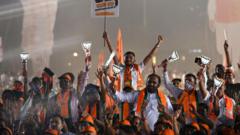As electoral trends indicate, the Bharatiya Janata Party (BJP) is set to secure a commanding majority in Maharashtra, with implications for regional politics.
BJP Poised for Major Victory in Maharashtra’s Regional Elections

BJP Poised for Major Victory in Maharashtra’s Regional Elections
Prime Minister Modi’s BJP leads in Maharashtra, showcasing a significant political comeback in India’s wealthiest state.
In a significant political development, Prime Minister Narendra Modi's Bharatiya Janata Party (BJP) is on track to achieve a remarkable victory in Maharashtra, India's richest state. Current trends suggest the BJP and its coalition partners are leading in nearly 220 out of the 288 seats, surpassing the crucial halfway threshold required to establish a government. Maharashtra, home to Mumbai, India's financial heart, plays a vital role in the nation's political landscape.
This election marked the first regional contest in the state since the earlier parliamentary elections, during which Modi secured a historic third term but failed to maintain an outright majority and was compelled to align with regional allies. In the recent parliamentary polls, Maharashtra was a battleground where the BJP faced setbacks, allowing opposition parties to capture approximately two-thirds of the seats.
While BJP appears set for a comfortable win in Maharashtra, it simultaneously faces challenges in Jharkhand, where the Congress party and its allies are positioned to triumph. Political analysts predict that retaining power in Maharashtra could give the BJP a much-needed boost following recent regional successes, including victories in Haryana.
BJP spokesperson Pravin Darekar expressed surprise at the election results, noting the overwhelming support received by the party. Modi spearheaded the campaign, emphasizing multiple welfare schemes focused on agricultural communities prevalent in Maharashtra, which is known for its substantial production of agricultural products, such as onions and cotton.
Opposition factions, aiming to capitalize on similar voter bases, presented promises of farm loan waivers and financial aid for seniors and women. However, critics caution that the competing promises could lead to significant fiscal challenges for the newly formed government, which will have to navigate voter expectations carefully.
In Jharkhand, the political landscape has also shifted dramatically, especially following the arrest of Chief Minister Hemant Soren on corruption allegations—a charge he denies. After his release in June, Soren campaigned vigorously to garner support based on sympathy votes, claiming corruption accusations were politically motivated. As tribal communities, constituting nearly 9% of India's population, remain marginalized, Jharkhand’s election narrative revolves around promises of economic incentives, including cash and healthcare incentives.
The unfolding dynamics in both Maharashtra and Jharkhand signal a turbulent yet revealing phase in India's regional politics, reinforcing the significance of elections in influencing state governance and party strategies.
This election marked the first regional contest in the state since the earlier parliamentary elections, during which Modi secured a historic third term but failed to maintain an outright majority and was compelled to align with regional allies. In the recent parliamentary polls, Maharashtra was a battleground where the BJP faced setbacks, allowing opposition parties to capture approximately two-thirds of the seats.
While BJP appears set for a comfortable win in Maharashtra, it simultaneously faces challenges in Jharkhand, where the Congress party and its allies are positioned to triumph. Political analysts predict that retaining power in Maharashtra could give the BJP a much-needed boost following recent regional successes, including victories in Haryana.
BJP spokesperson Pravin Darekar expressed surprise at the election results, noting the overwhelming support received by the party. Modi spearheaded the campaign, emphasizing multiple welfare schemes focused on agricultural communities prevalent in Maharashtra, which is known for its substantial production of agricultural products, such as onions and cotton.
Opposition factions, aiming to capitalize on similar voter bases, presented promises of farm loan waivers and financial aid for seniors and women. However, critics caution that the competing promises could lead to significant fiscal challenges for the newly formed government, which will have to navigate voter expectations carefully.
In Jharkhand, the political landscape has also shifted dramatically, especially following the arrest of Chief Minister Hemant Soren on corruption allegations—a charge he denies. After his release in June, Soren campaigned vigorously to garner support based on sympathy votes, claiming corruption accusations were politically motivated. As tribal communities, constituting nearly 9% of India's population, remain marginalized, Jharkhand’s election narrative revolves around promises of economic incentives, including cash and healthcare incentives.
The unfolding dynamics in both Maharashtra and Jharkhand signal a turbulent yet revealing phase in India's regional politics, reinforcing the significance of elections in influencing state governance and party strategies.






















